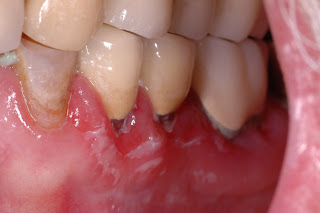A: The diagnosis must be obtained from a qualified heath care professional. Usually a biopsy is advisable to rule out other diseases.
Q: Is oral lichen planus common?
A: Oral lichen planus affects approximately 2% of the population. Although it may occur in all populations, women over 50 years are most commonly affected.
Q: I have oral lichen planus and my mouth hurts each time I brush my teeth. How do I avoid this?
A: Often with oral lichen planus, it is necessary to use mild toothpaste with minimal flavorings and a soft toothbrush
Q: Is oral lichen planus contagious?
A: No. Your partner or family members will not be infected by your lichen planus and you did not catch it from anyone. The disorder occurs when the immune system mounts an attack against cells of the oral tissue. The reasons for this abnormal immune response are still unknown.
Q: Does oral lichen planus go away with treatment?
A: Oral lichen planus is a chronic disease that can be controlled but not eliminated. A goal of therapy is to convert bothersome erosive lichen planus to the asymptomatic lacy (reticular) form. This requires some maintenance to keep the disease under control. Since oral lichen planus is incurable, flare-ups requiring additional therapy can occur.
Q: Can oral lichen planus lead to cancer?
A: This association remains controversial because there are cases of this occurring. Therefore, it is essential to obtain an accurate diagnosis, typically via biopsy. All patients with oral lichen planus should have periodic evaluations to assess the efficacy of therapy and to monitor for suspicious changes.
 |
| Erosive Oral Lichen Planus |
Other Sources of Information on Oral Lichen Planus

